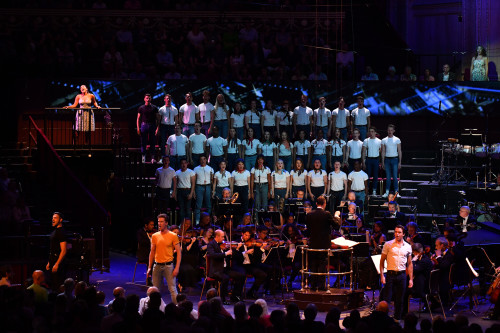
 United Kingdom PROM 38 – Bernstein, West Side Story (concert version): Soloists, students from ArtsEd and Mountview, John Wilson Orchestra / John Wilson (conductor). Royal Albert Hall, London, 11.8.2018. (CC)
United Kingdom PROM 38 – Bernstein, West Side Story (concert version): Soloists, students from ArtsEd and Mountview, John Wilson Orchestra / John Wilson (conductor). Royal Albert Hall, London, 11.8.2018. (CC)

(c) BBC/Chris Christodoulou
Maria – Mikaela Bennett
Tony – Ross Lekites
Anita – Eden Espinosa
Riff – Leo Roberts
Bernardo – Gian Marco Schiaretti
Rosalia – Emma Kingston
Francisca – Laila Zaidi
Consuelo – Jocasta Almgill
Snowboy/Big Deal – Christopher Jordan-Marshall
Action – Alistair Brammer
Baby John – Jack North
Diesel – Michael Colbourne
A-Rab – Fra Fee
Officer Krupke – Phil Barnett
Louise Alder – Somewhere
The last days of a 1950s Summer provide the setting for this unique piece. In West Side Story, Leonard Bernstein and his stellar team of collaborators, revolutionized the idea of the musical, setting Shakespeare’s Romeo and Juliet in New York’s Upper West Side, in doing so highlighting the universality of the Bard. But he also brought a previously unheard-of sophistication to the genre. It was apt, then, that John Wilson’s reading allowed us to appreciate the panoply of influences and references in Bernstein’s magnificent score, from soaring Puccini lines (and dark Puccini emotions) to the cabaret of Kurt Weill (particularly present in the opening Prologue). Wilson’s orchestra is a magnificent hybrid of machine and animal, superhumanly together, including in Wilson’s sprint of a mambo, and yet capable of evoking the most primal of emotions. Wilson’s undemonstrative, crystal clear conducting style masks a clear immersion in this music; careful listening reveals an ear for detail coupled with intense sensitivity (the underpinning of the dialogue before ‘Only you’ being a case in point). The ‘concert version’ on offer omitted Act I, Scene 2 (The Bridal Shop) and Act II, Scene 5 (The Cellar, wherein Tony hides in the basement, a scene of some violence).
As a setting (we had a stage director, Stephen Wilson), the Royal Albert Hall’s spaces were well used, the top level to the side used as a balcony; the back of the stage, too, had its moment. Most of the action was focused on the front of the stage, and – a big deal for some – there was no dancing. Lighting held messages in the equivalent of big letters: red, here, could only stand for blood. But was there an extra element adding bite? Was I the only one to link the territory battle of the Jets (White Americans) and Sharks (Puerto Ricans, and recent immigrants, at that), and its exteriorisation in the insular thinking of lines like ‘One of your own kind, stick to your own kind’, to the knuckle-dragging mass suicide of Brexit?
There was one moment that appeared at the time to be a staging miscalculation, and presumably will remain so for most of the audience that either did not attend Prom 39 or listen to it on the BBC Radio iPlayer. The very end in Prom 38 found Tony suddenly gripping his stomach and dying though there was no sound of a shot from Chino’s gun. The emotional impact of the ending was still there (in a performance as fine as this one it would be impossible for it not to be) but it was a touch blunted as it does rather look as if he had a stomach cramp. Listening to the BBC Radio iPlayer, there actually was a crack of a gunshot that led to Tony’s demise in the later performance, so one can only imagine it was missed out in error earlier on.
The cast, many of whom boast Broadway credits, would be difficult to better. US and Canadian members blended perfectly with UK-based ones. Mikes were used for amplification. Maria was taken by the Ottawan singer Mikaela Bennett, who embraced the part with every iota of her being. Fresh-voiced and impulsive, she was the perfect foil for Ross Lekites’ unfeasibly confident Tony. Lekites’ voice was beautifully open, his pitching perfect. They needed a firm Anita as a foil, and received it in the fiery, full-voiced Eden Espinoza (best known for her Elphaba Wicked on Broadway and in LA and San Francisco). No-one could have doubted the strength of Anita’s feelings in ‘A Boy Like That’, as she gave full voice and, seemingly, beyond; and how spine-tingly magnificent was Maria’s retort of ‘Oh no, Anita, no’, culminating in an almost frighteningly impactful ‘you should know better’ after the most beautifully delineated duet between the two. The tenderness of ‘I Have a Love’ that follows was remarkable, not least from Wilson’s softest, whispered strings.
The famous number ‘Somewhere’ was sung beautifully by Louise Alder (a British singer currently a member of Frankfurt Opera), Alder only moved into operatic-voice territory proper at the very climactic top note of that number. Bernardo, leader of the Sharks, was taken by Gian Marco Schiaretti, an imposing bodily receptacle for testosterone who also sings and acts.
The two groups of lads, the Jets and Sharks, as groups, were entirely convincing, the Jets’ members a magnificently contrasted group of individuals who came together to sing as one unit. The Officer Krupke number was a terrific blast of energy, slick as can be over the orchestra’s vamp-till-ready accompaniment. Smaller ensemble numbers (for example ‘A Boy Like That’) were incredibly tight, allowing Bernstein’s masterly vocal counterpoint to make its full effect: it sounded like this cast had been singing the score together for years. The finger-clicking group of students from ArtsEd and Mountview did themselves proud.
A superb performance; and to think, in Prom 39, just a few hours later, they had to do it all again.
Colin Clarke
